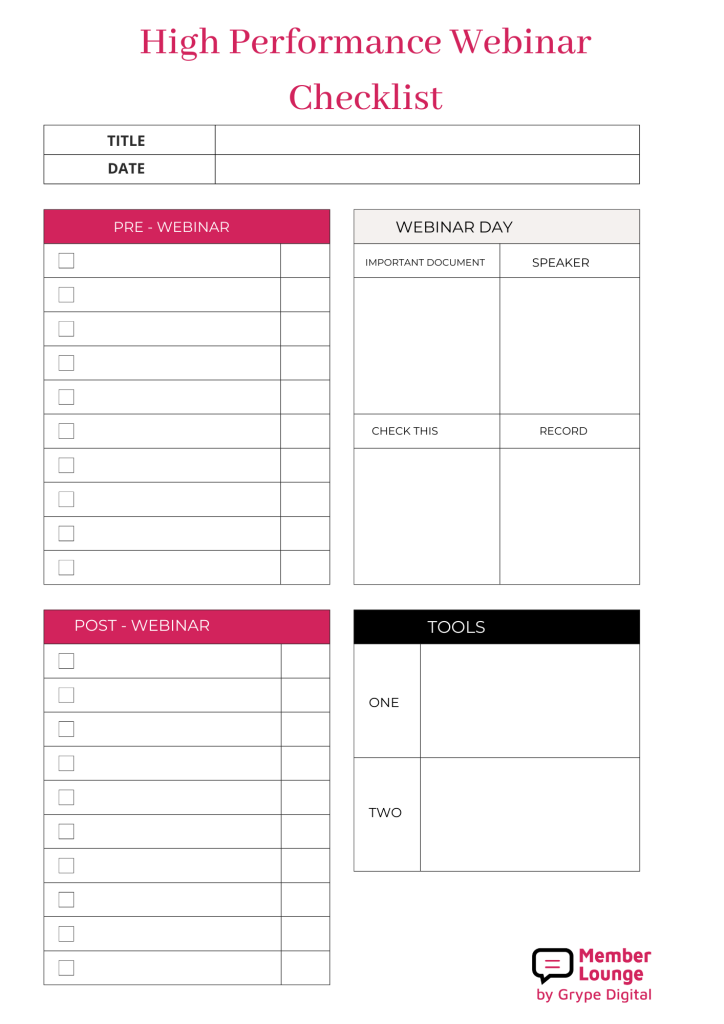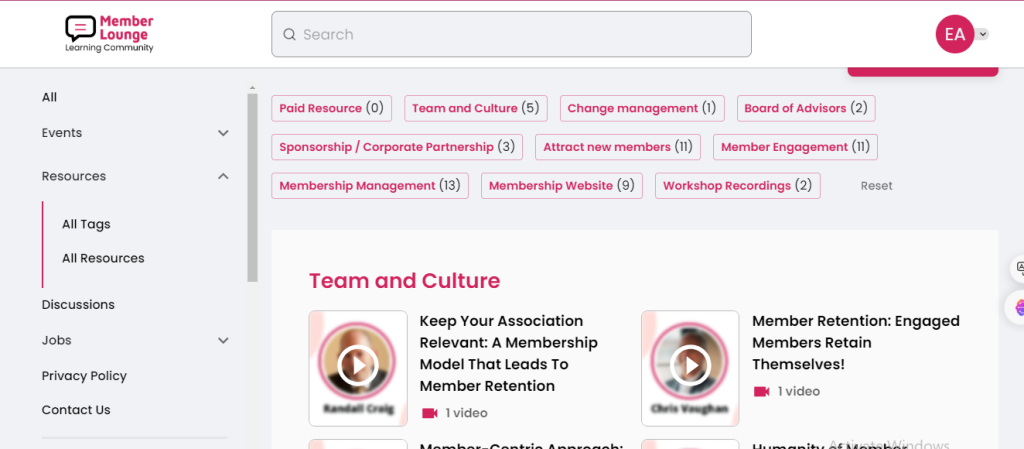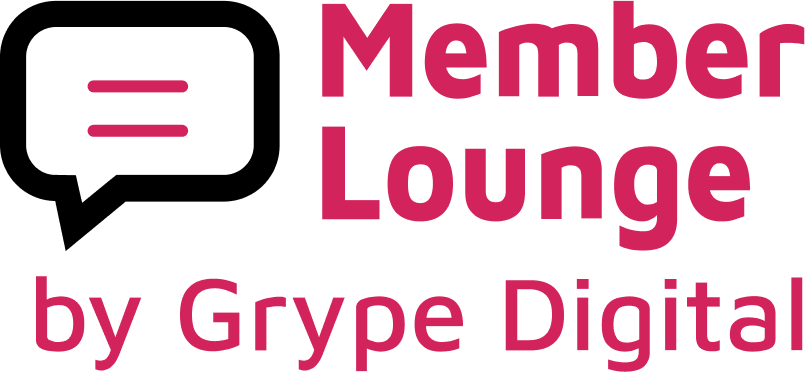Hosting a successful webinar isn’t just about showing up and hitting “record.” If you plan and execute them strategically, they can be powerful tools for finding new members, making people more aware of your association, and keeping your audience engaged.
But how do you make sure your webinar is awesome and gets you results?
We’ll break down the webinar planning process into a step-by-step checklist, unveiling the secrets we have used over the years to transform our webinars into high performance events.

Start with Planning
Before you start, it is important to lay the groundwork, as this will mostly determine your webinar’s success. Here is what you need to do:
Clarify Your Objective and Goals
Before diving into the webinar, you need to understand why you’re doing it and what you aim to achieve. Are you seeking leads, educating, promoting your association, or establishing authority? Break down these goals into specific, measurable, achievable, relevant, and time-bound (SMART) objectives.
Know Your Audience
Conduct thorough research to identify and understand your target audience. This will help you craft a winning topic and tailor your webinar content to address your attendee’s specific needs and interests.
Establish Key Performance Indicators (KPIs)
Decide how to know if your webinar did well. Common KPIs include attendance, engagement metrics (viewing time, questions asked, etc.), how many new potential members you found, how many became actual members, and your audience satisfaction. Collect this feedback through post-webinar surveys to see what went well and what could be better.
Get A Great Speaker And Host
You need two key players to get a high performance webinar: a knowledgeable speaker who shares important information, and an engaging host who keeps things interesting. The speaker shares expertise, while the host makes it fun and interactive. Together, they make your webinar both informative and enjoyable.
Spread the Word
Now you need to cut through the noise and turn your webinar into an event that will be well anticipated. Promote your webinar like a pro using a multichannel approach and the right messaging. Use emails, social media, your website, and other association networks to promote your webinar.
Use Emails
When sending emails to promote your webinar, make sure they’re interesting and clearly show why people should join. Use intrigue to catch people’s attention and add a teaser to make them curious and want to learn more.
Use Your Website
Make it easy for people to sign up for your webinar on your website! Put clear calls to action and registration links right on your homepage. To grab even more attention, consider using pop-ups or sliders that advertise the webinar benefits. This will make signing up super convenient and turn your website visitors into registered attendees.
Leverage Your Network
Use your association’s connections, like forums and publications, to tell more people about your webinar. Your speakers can also come from this network if they have a large following and can help you co-promote. Also, team up with influential members to spread the word even further. This way, you can reach more people and make your webinar more successful.
Be on Social
Instead of just announcing your webinar, create engaging posts that grab attention on social media. Use relevant hashtags to reach more people, and build anticipation by sharing interesting bits about the webinar beforehand. This will turn your followers into excited participants.
Run Advertising Campaigns
Paid ads can help you reach new people who might be interested in your webinar. But don’t just throw up any ad! Make sure your ads are eye-catching and explain why people should attend. Pick websites or apps where your target audience hangs out if you want to get the best results.
Ensure A Seamless Webinar Experience
A successful webinar depends on everything running smoothly and looking professional. To help you get ready, here’s a checklist to make sure you’re on track before your webinar:
Do a tech check
Don’t leave anything to chance! Run a complete test of your webinar platform, including audio, video, screen sharing, and presentation tools. Simulate the entire presentation to identify and resolve any technical glitches beforehand.
Practice to Get Better
Schedule a practice session to rehearse your presentation delivery, timing, and flow. This practice run allows you to refine your content, address any pacing issues, and gain confidence in your delivery.
Have A Structured Q&A Plan
Anticipate your audience’s questions and develop a clear strategy for managing them during the webinar. Will you have a dedicated Q&A session at the end, or will you answer questions throughout the presentation? Consider using a Q&A platform or encouraging attendees to submit questions beforehand.
Plan for the Unexpected
While we hope for the best, it’s always wise to have a backup plan. Anticipate potential technical difficulties such as internet outages or software malfunctions. Develop contingency plans for each scenario, such as having a backup presenter or presentation slides readily available.
DAY Of Webinar Checklist
The big day has arrived! Here are some key actions you need to ensure a smooth and engaging webinar experience for both you and your attendees:
Send Reminder Emails
Send a final reminder email to people who haven’t signed up yet for the webinar. Include all the details like date, time, and how to join in. Also, send a reminder to those who have already signed up. Remind them why it’s worth attending and encourage them to join in.
Double-Check Your Setup
Double-check to make sure your tech is set up right. Plug in your laptop to keep it powered, turn off any sounds on your devices, find a quiet place to present, and check your internet connection.
Record Your Webinar
Not everyone can attend your live session, so make sure to click record. By recording the webinar, you create a valuable resource that can be shared with those who missed it or who want to revisit the content later. Upload it to your website, and social media, and distribute it via email, expanding your reach and maximizing the impact of your webinar presentation.
To be extra safe, record your webinar in two ways. Use your webinar platform to record your screen and voice, and also record just your voice on another device like your phone. This way, if anything goes wrong, you still have a good recording to share later.
Live Questions and Answers
If you can, have a live Q&A session where people can ask questions while you’re presenting. This makes it feel like a real conversation and helps address their specific concerns. You can even ask them to turn on their cameras for a more personal touch.
Chat Room Participation
Use the chat feature during your webinar to encourage people to join in. Ask them to share what they’ve learned or their favorite parts of the presentation. This would not only help reinforce what you’re talking about but also let you see if everyone is following along.
Interactive Polls
Ask your audience interesting questions using polls in the chat. This not only makes the webinar more fun but also gives you a better idea of what they think. Plus, you can learn more about their opinions and preferences.
Turn Challenges into Learning Opportunities
During a live webinar, things might not always go as planned. But these unexpected moments can teach us valuable lessons. Stay calm, be flexible, and see them as chances to connect with your audience. When someone asks a question you didn’t expect, use it to explore the topic further.
Post-Webinar Checklist
The conclusion of your live webinar doesn’t signify the end of the learning experience. Here are some key strategies to maintain engagement, gather valuable insights, and nurture relationships with your audience after the webinar:
Upload the Recording on your Member Portal
Don’t let the valuable content from your webinar disappear! Upload the recording to a dedicated member portal on your website, allowing your members to revisit the information at their convenience.

Member Lounge helps you build a member portal with a dedicated member library that not only reinforces key takeaways but also provides a valuable resource for those who may have missed your live session.
Send a Follow-Up Email
Gratitude goes a long way! You can send a follow-up email to your attendees thanking them for their participation and include the link to the webinar recording while also giving them a special invite to secure a seat to your next webinar.
Measure Your Success
After your webinar, look at some important numbers to see how it went. Examine metrics like attendance rates, engagement during polls and Q&A sessions, and if they stayed until the end. This tells you what worked well and what you could do better next time.
Address the Gaps
During the live session, You may not get to all the questions because of time. Afterward, go back through the chat or Q&A log to find any questions that didn’t get answered. If there are big topics that many people ask about, think about making more content like blog posts or videos to talk about them more.
Repurpose Your Webinar Recording
You can take the good stuff from your webinar and make short videos out of it. Share them on your website, social media, and other places online. This not only keeps the value of your webinar going but also brings in new people who might want to come to your next events.





